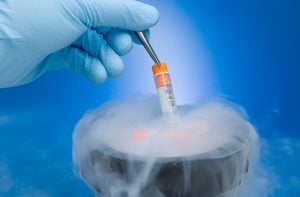New California Law Advances Embryo Donation By Baby Steps
Embryo donors, recipients, and the resulting children are each a little more protected by the state's efforts.
 On August 22, 2022, Gov. Gavin Newsom of California signed AB-2495, which codifies certain embryo donation protocols into state law.
On August 22, 2022, Gov. Gavin Newsom of California signed AB-2495, which codifies certain embryo donation protocols into state law.
Donors Are Just Donors
Specifically, the new Golden State law promotes embryo donation by ensuring that donors are never considered the legal parents of children that are born from their donations. For instance, Section 7613 of the Family Code now includes:

Law Firms Now Have A Choice In Their Document Comparison Software
(d) (1) A provider of an embryo for use in assisted reproduction to an intended parent who is not the provider’s spouse or nonmarital partner is treated in law as if the provider is not the natural parent of a child thereby conceived unless the court finds satisfactory evidence that the provider and the intended parent intended for the provider to be a parent.
So, unless the donor really means to be a parent, California law is now clear that the donors of donated embryos are not the legal parents of children resulting from the donated embryos. So far, there’s not much controversy on this idea.
Consent Of Egg And Sperm Providers Required
Another new section to the Family Code provides that:
Sponsored

Why Do AI And Legal Professionals Make The Perfect Partnership?


Diving Into Generative AI: A Practical Guide For Law Firms Starting From Scratch

Law Firms Now Have A Choice In Their Document Comparison Software

Diving Into Generative AI: A Practical Guide For Law Firms Starting From Scratch
(2) If the provider of ova, semen, or embryos is not the original source of the ova or sperm, each original provider’s written consent to the donation is required unless that person has executed a writing to consent, waive, or relinquish their right to the genetic material, or as otherwise ordered by a court of law.
This provision addresses the need for appropriate consent from the original providers of the eggs and sperm that formed the embryos for donation. Many embryos being donated are formed by a couple who used their own eggs and sperm with in vitro fertilization (IVF) procedures to build their families and then were later in a position to help others by donating their remaining embryos. Other embryos for donation, by contrast, were formed with the assistance of an egg or sperm donor, or both, where the now-embryo donors were previously recipients in an egg or sperm donation.
An egg or sperm donor may very well have strong feelings about their reproductive tissue being further donated from the original recipients to others. So it seems appropriate that the new law provides clarity that the original sperm and egg providers should necessarily be providing consent.
Why This, Why Now?
I spoke with California attorney and assisted reproductive law specialist, Deborah Wald about the origin of the bill. Wald is the president-elect of the Academy of California Adoption-ART Lawyers (ACAL), the force behind the bill. She explained that ACAL has regularly advocated for years, with success, to update the Family Code when advances in technology and changes in family formation practices merit such an update.
Sponsored

AI’s Impact On Law Firms Of Every Size


Gain An Instant Understanding Of New Complaints With LexisNexis Snapshot
Wald and ACAL view this expansion of the California Family Code now explicitly including embryo donation, in addition to egg and sperm donation, as a natural and noncontroversial update. Wald pointed out that the bill was carried by Assemblyperson Jim Patterson and received bipartisan and unanimous support. Not a single “Nay” was lodged against the bill at any point in its legislative process.
More Work To Be Done
Wald explained that the new law is a good starting point. Including “embryos” in the law is a substantive and helpful building block for the law to address more complicated legal issues in the future. Namely, Wald described a current, reoccurring issue that courts have struggled with — the question of what to do when there are multiple claims and competing interests as to any given embryo. Wald mentioned a recent case that she worked on where a divorcing couple had embryos, but no children. The embryos presented the only possibility of a genetically linked child for one of the parties, but the other refused consent for her use of the embryos. Wald explained that California courts have routinely acted in favor of the party wishing not to reproduce over a party wishing to use the disputed embryos for conception purposes.
Congratulations, California, on joining the short list of states to update their laws to provide specific recognition and protection for a common family building practice. Embryo donors, recipients, and the resulting children are each a little more protected by your efforts.
 Ellen Trachman is the Managing Attorney of Trachman Law Center, LLC, a Denver-based law firm specializing in assisted reproductive technology law, and co-host of the podcast I Want To Put A Baby In You. You can reach her at babies@abovethelaw.com.
Ellen Trachman is the Managing Attorney of Trachman Law Center, LLC, a Denver-based law firm specializing in assisted reproductive technology law, and co-host of the podcast I Want To Put A Baby In You. You can reach her at babies@abovethelaw.com.







